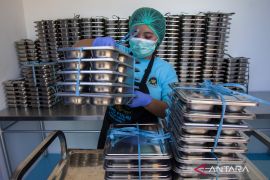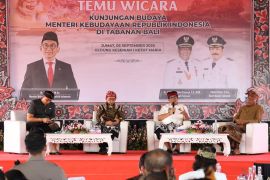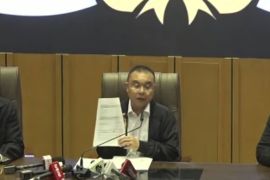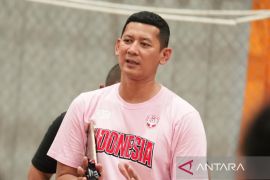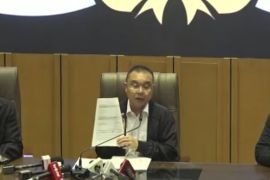Yudhoyono said that he could not force Indonesians living abroad to return to Indonesia. He, however, hoped that if one day the nation needs them, they would be willing to return to their mother country.Jakarta (ANTARA News) - President Susilo Bambang Yudhoyono told Indonesian Diaspora in Berlin, Germany on March 5, 2013, to always remember Indonesia and give contribution for the country`s development wherever they are.
"It is not important whether you will return to Indonesia or you have decided to live in other countries. The most important is how you could always give your contribution to Indonesia," the head of state said before 60 members of Indonesian Diaspora consisting of among others post-graduate students, researchers, and lecturers.
Yudhoyono said that he could not force Indonesians living abroad to return to Indonesia. He, however, hoped that if one day the nation needs them, they would be willing to return to their mother country.
Indonesian Diaspora groups Indonesian citizens (WNI) who live overseas, and Indonesians who have migrated from Indonesia and acquired foreign nationalities (WNA), as well as Indonesian descendants, or people of Indonesian origin.
The number of registered Indonesian diaspora is 4.6 million people, but it is estimated that there are around eight to 10 million people of Indonesian diaspora abroad.
The government plans to organize the Second Congress of Indonesian Diaspora in Jakarta on August 18-20 this year, after holding the first congress in Los Angeles, California, the US, on July 6-8, 2012, which was attended by around 2,056 people.
The second congress`s theme will be "Going Back Home" and the number of participants is expected to reach 2,000-4,000 members of the Indonesian Diaspora from all over the world. The theme of the first congress of Indonesian Diaspora was "Harmony in Diversity".
As part of the preparations for the second congress, the foreign ministry organized a national workshop on Indonesian Diaspora in Jakarta, on February 27, 2013.
The workshop, which was opened by Deputy Foreign Minister Wardana, was attended by representatives of Indonesian Diaspora and officials of the ministry of law and human rights, the ministry of foreign affairs, the General Election Commission (KPU), the ministry of trade, and the Indonesia Investment Coordinating Board (BKPM).
The workshops discussed the government`s roles in facilitating Indonesian Diaspora overseas in general elections, trading, immigration, and investment matters.
The Indonesian Government currently is taking concrete steps to develop a strong partnership with the Indonesian Diaspora, and initiating the process of easing visa procedures, including by issuing special visas for Indonesian Diaspora members who are no longer Indonesian citizens.
The Congress of Indonesian Diaspora II is expected to push the establishment of Indonesian Diaspora Desk which will give services and protection to the diaspora and in the long term could build a better network of Indonesian diaspora globally.
Indonesian Ambassador to the US Dino Patti Djalal, who initiated the first Congress of Indonesian Diaspora, when speaking in the Jakarta workshop said that the second congress should be able to make a history and strengthen the networking, programs and concrete actions.
For that purpose, the upcoming congress must set realistic targets and focus on programs of action that will provide concrete contribution for the national development.
Dino Djalal said the target was not an easy one, because around 80-90 percent of Indonesian Diaspora come from the middle class. "The majority of them work in the office, so they would need an approval from their office to come to Indonesia," he stated.
Therefore, his team would start campaigns and advertisements to build up the momentum for the Congress.
Ambassador M. Wahid Supriyadi in his capacity as the Indonesian foreign ministry`s head of the Indonesian Diaspora Desk, reported in the Jakarta workshop that preparations for the Congress of Indonesian Diaspora II have been made.
In the first congress in Lost Angeles, Ambassador Djalal said the number of Indonesian Diaspora members worldwide is bigger than the Korean and Vietnamese Diasporas, but smaller than Indian and Chinese Diasporas.
The per-capita income of Indonesian Diaspora worldwide is estimated to be five times bigger than the per-capita income of Indonesia. The median income of Indonesia Diaspora in
the US alone is $59,000/year, which is $10,000 more than the annual income of all Americans which is $45,000. Every year, Indonesian Diasporas send $7 billion back home to their motherland, he said.
"As President Susilo Bambang Yudhoyono has said, you, the Indonesian Diasporas, are an amazing community. You are unique, diverse and extraordinary. You speak many languages. You are more exposed to the world, that`s why you tend to be more open-minded.
You have skills. You take risk. You are used to competition because you have no choice but to struggle to blend in to succeed. And you are opportunity driven," he said before Indonesian Diaspora participating in the Los Angeles congress.
The Indonesian Diaspora in the US is more than 150 thousand people, and the largest number is believed to be in the Netherlands, Singapore, Australia, Malaysia, Madagascar, Suriname, and South Africa.
They consist of various professions and activities, such as high-skilled workers, informal sector workers, politicians, artists, entrepreneurs, educators, innovators, contractors, oil and gas experts, ship crew, athletes, students, and religious figures.
"Wherever you go, you obey the local custom and law, yet you all have one thing in common: a love for Indonesia. You all live in various countries with colorful lives. However, many of you still have "Red and White" in your hearts," President Yudhoyono said last year in his welcoming remarks during the First Congress of Indonesian Diaspora.(*)
Reporter: Fardah
Editor: Heru Purwanto
Copyright © ANTARA 2013

